#the inability to read a room but on opposite ends of the spectrum is something that can be so personal ......
Explore tagged Tumblr posts
Text



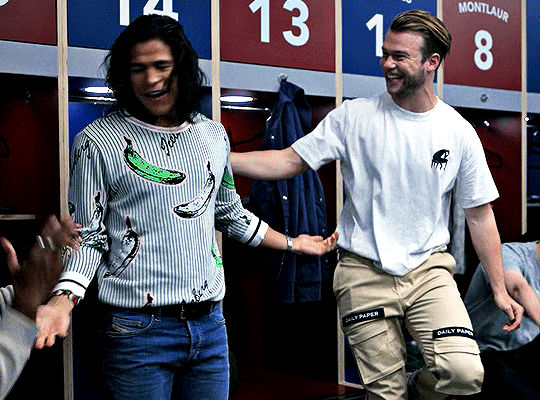
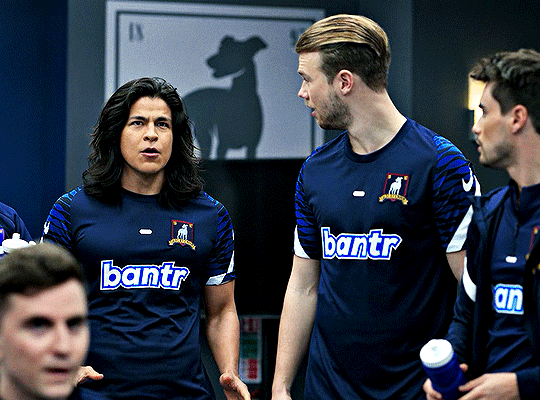
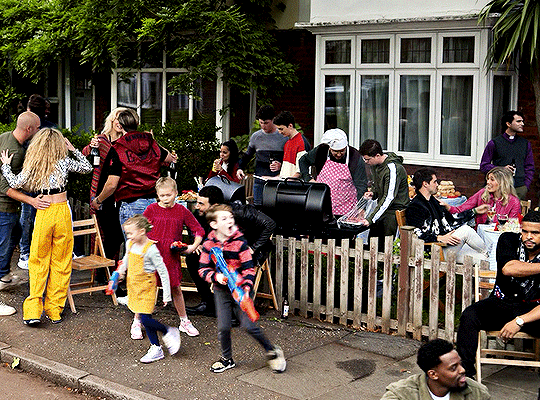
DANI ROJAS & JAN MAAS Ted Lasso (2020-2023)
#ted lasso#tedlassoedit#tedlassosource#dani rojas#jan maas#cristo fernández#david elsendoorn#gifs.#they're literally best friends look at them#numbers right next to each other... no nonsense tall guy + silly smiley shorter guy... realist + idealist...#unstoppable force (jan's honesty & inability to read a room) vs immovable object (dani's positivity & inability to read a room)#in the first ep of s3 when they're talking about richmond being placed last on everyone's predictions for the season or smth:#jan spitting out statistics about relegations that no one wants to hear + dani's 'maybe they're trying to motivate us!'#the inability to read a room but on opposite ends of the spectrum is something that can be so personal ......
2K notes
·
View notes
Text
Character Parallels: Chase vs Julia
First off, let me start with:
SEASON 3 SPOILER WARNING.
This is somewhat a continuation from my original Chase Devineaux Case Study I did a while back. Feel free to read it to fully understand the context behind my opinions and thoughts on Chase, Julia and such discussed below. Let’s begin.
Although Season 3 was short, it was still a season that provided us with a new potential story catalyst to propel the plot in the form of major character development.
A bit of context:
Throughout the series, Chase Devineaux was always sceptical and often outright against the idea that Carmen Sandiego could have ulterior motives (due to his ill-fated meetings with the said person driving that home and on the surface she literally is stealing), an idea his previous partner, Julia Argent, was the spokesperson for. To quote a long story short, Chase was not too pleased or in agreement with the idea proposed by Julia: Carmen Sandiego isn’t the real enemy. Others shunned this idea too (Zari & Chief) and consistently was never outright ‘proved’ from a physical evidence standpoint. Both stood on opposite ends of the ‘who really is Carmen Sandiego’ spectrum. This was the major theme of division between Chase and Julia, a plot point further driven by the unlucky streak he suffered when dealing with Team Red, and VILE. Mostly he, and ACME, could not separate the entities completely, even up until the end of Season 3.
In the S03E04, ‘The Masks of Venice Caper’, after 3 seasons of being moments away from Carmen Sandiego at every step, Chase succeeds. After a long and clearly exhausting chase throughout the streets of Venice, he is able to finally catch up.
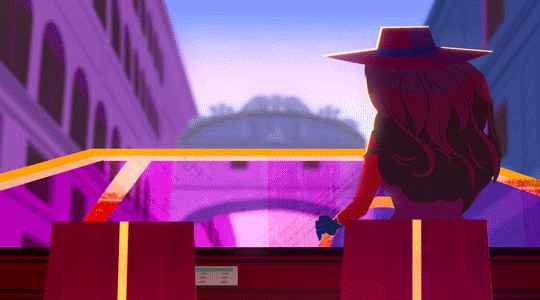
He leaps aboard after making the jump and officially bears witness to the handing over of goods, something which Julia was only ever afforded. Chase is blindsided at her easy surrender, simple innocent explanation and instantly clean escape. He does not go after her, instead stands bewildered at what she said, leaving him with the important line of: ‘Jules would understand’, (because she would with her prior knowledge and experience), to digest what just occurred.

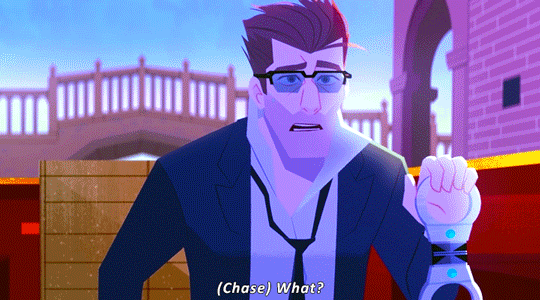

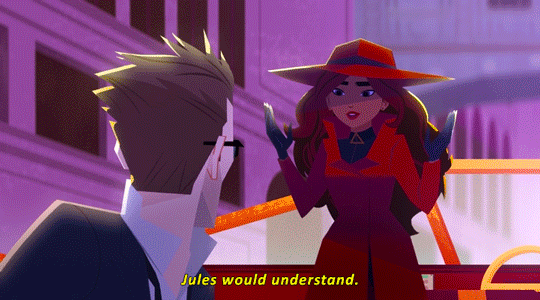
This was not what he was expecting, as on other occasions they met him with hostility or evasion without explanation. Instead, he is treated as if he were Julia, filling the role as a substitute, as she is no longer on the scene to be the recipient of the ‘handoff’. At this moment, thanks to Carmen’s finale line, it all clicks. Previous conversations run through his mind, visibly questioning, as he makes the connection before being interrupted by Agent Zari, congratulating him on stopping the robbery.
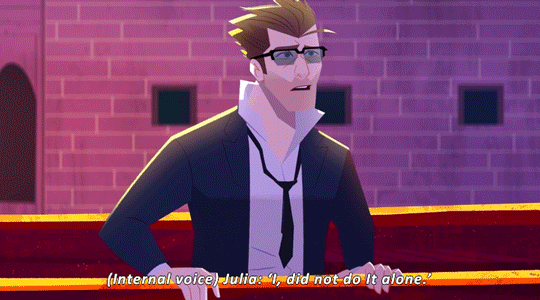

The confirmation that he finally gets it is reaffirmed by a theme of a ‘silent partner’ which he now uses himself with commenting, awkwardly, that ‘I did not do it alone’ (A call back to S01E09, see below). This is the formal affirmation that he now understands that Carmen is not the enemy. There was no way he would have ever connected the dots without visual verification, experiencing it for himself first hand, a situation Julia experienced multiple times by fortune, something people forget when watching him grapple with his inability to detain the ‘thief’. Julia was provided with many chances throughout season 1-2 to work with or in situational coincidence with Carmen and aid in the protection of potential goods in harm’s way. (Most notably S02E04)
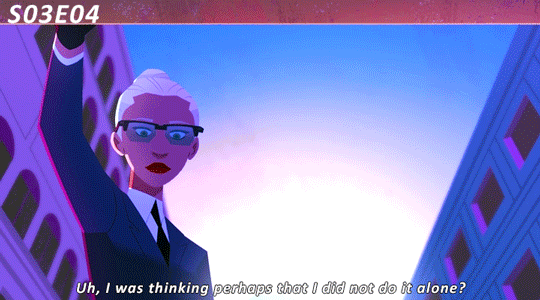
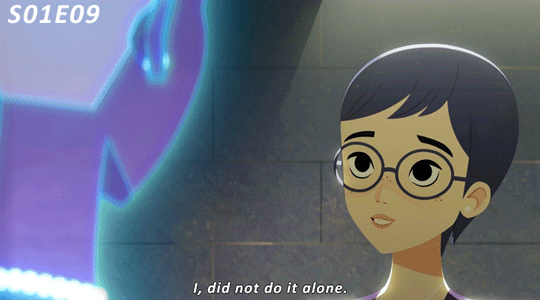
Julia’s departure, though disappointing to fans (and myself), was a crucial plot device to enable Chase to be finally exposed to the events which would lead him to change his mind for the better. Unless by some miracle he was chosen as the recipient of Team Red’s well wishes with Julia on the scene and/or in tow, it would have taken far longer for the realisation to be made. An understanding that is only able to be fully recognised by Julia and Chase. The only two people around long enough and familiar enough with Carmen Sandiego and the entire case to be in any position to come to the right conclusion about her intentions.
As many may say, seeing is believing. And seeing was what he needed to believe, both Chase and Julia needing that direct witnessing to understand. Seems the red lining of his original coat meant something after all.
(Do note: Julia was more inclined and susceptible to a conflicting opinion due to her heightened observation skills from the get-go but still needed visual confirmation, which she got, to stand strong with her diverging opinion on Carmen Sandiego.)
The Parallels:
In the next and final episode of S03E05, "The Jolly Good Show Caper", we are greeted with a callback to S01E03’s episode "The Sticky Rice Caper". Instead of Chase and Julia being on their way to interrogate Gray in the Paris Interpol office, Agent Zari and Chase are walking through the halls of the Italian Interpol office to interrogate their latest captured VILE operative, Neal the Eel. From a clearly visual standpoint (see below), the makeup of the scene and placement of characters is a direct callback to the dynamic between both Chase and Julia, and now between Chase and Zari.
S01E03 VS S03E05


Chase now takes the place of Julia, physically and mentally, who listens to a rundown of the situation, proposes a vague counter-argument which is disregarded by Zari. Chase is now wanting to look beneath the surface of the robbery or incident (like Julia always did), unlike before. Similar to the situation in S01E03, Zari is unwavering in her opinion that Carmen and the new detainee are in cahoots, Chase stating that his previous statement was merely ‘entertaining all possible angles’, a comment he further elaborates on to Chief at the end of the episode.
S03E05:
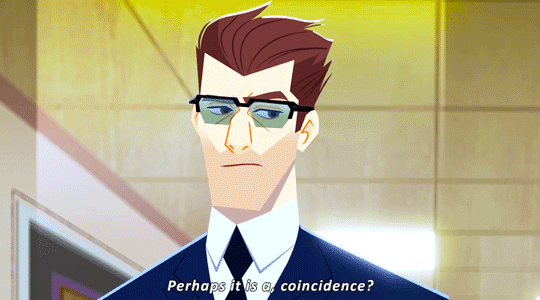

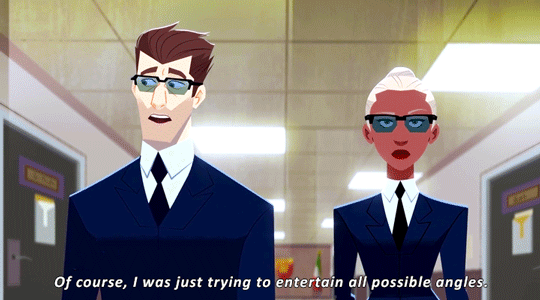
S01E03:


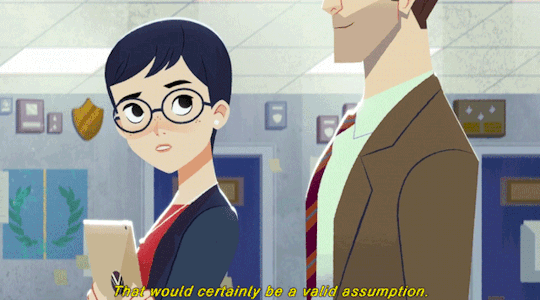
After coming to the interrogation room, Zari dramatically pushes it open in the same style as Chase did seasons earlier, halting her statement to reveal the suspect has ‘escaped’. Zari is stumped, Chase not too phased at this revelation and quickly checks the documents to understand what has occurred, once again.
S03E05
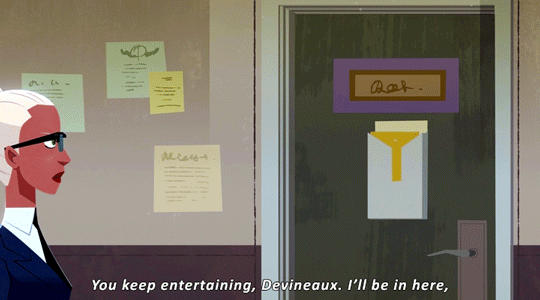
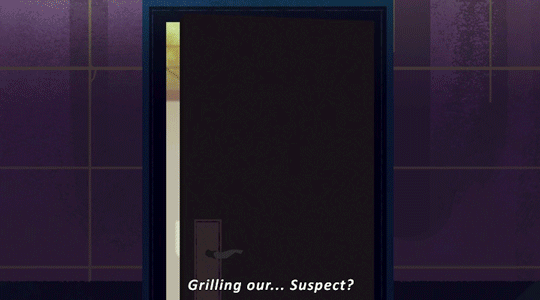
S01E03
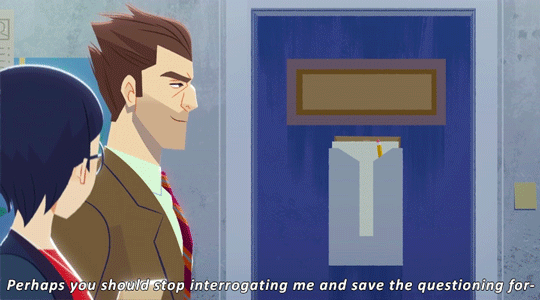
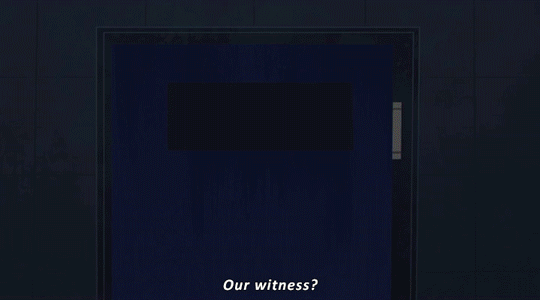
Chase again, takes the stance of the ‘Julia’, all-knowing and proceeds to correctly recount the possible scenario that they have found themselves in, having experienced this once before. This ‘recounting of events’ is confirmed to the audience by Chase’s voice monologuing of sorts over an escaping by boat, Neal.
S03E05
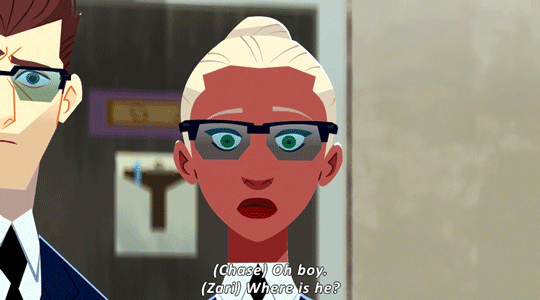

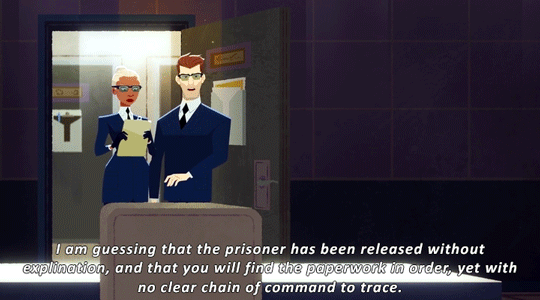
S01E03
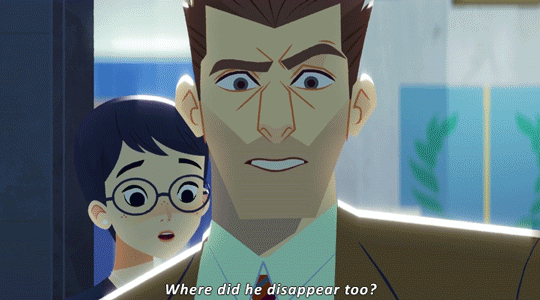

This scene is interesting for obvious reasons: it’s a direct call back to a later episode and the dynamic within. It is also a pivotal moment we see that Chase was always fully aware of what is happening around him, and really only required the correct pieces to fall into his lap at all the right times to now be the new ‘Julia’ in the dynamic. That style of a sequence of events is what helped Julia see the truth in Carmen’s actions in the first place. Chase has always been cognizant of the events around him, even if they could be contradictory to his main beliefs. Actively choosing not to present it to the audience, in favor of the popular opinion presented by and through ACME, their agents their leader that Carmen Sandiego is the enemy. Half of this being pressure, wanting to succeed in his work, gain praise for it and lack thereof witnessing first hand some sort of ‘positive’ reaffirmation of Carmen’s good intentions and that he really thought he was right. We see this through his sheer self disappointment and embarrassment when facing Chief after mistakes he had no true control over.
Towards the end of the same episode. Carmen is ‘captured’ in London. Agent Zari and Chase receive this development while travelling, Chase jumping out of his seat surprised, shocked, concerned that she was detained saying ‘that is terrible!’. Zari is notable taken aback, Chase quickly tries to collect himself and adjusts his statement and ends with ‘that. we were not the ones to make the arrest.’ Time has passed since the escape of Neal, Chase left to stew with his changing opinions and it clearly appears as if he no longer wishes for Carmen’s capture in the traditional sense, knowing that what she has been doing, is not criminally based. It’s unsure what his plans are when facing Carmen once again, but it at the very least no longer her capture.

Not only are Chase and Julia’s mindsets on the same path, but Chase is also no longer the driver between the pair. A fun nod to how Chase always drove, if dangerously at times.

After events unfold, Chase and Zari soon discover the planted crown jewels in Roundabouts office after a tip off, they run to retrieve them and Chase stops to glance out the window, witnessing Carmen Sandiego flying away from the scene. This is important, if a small detail, in once again showing us he has changed. He is far more observant and is the new candidate to witness the usual things Julia would if she were there. He stopped, was in the right place at the right time, recognised first hand the role Carmen plays in the grand scene of things, as a protector who runs interference.
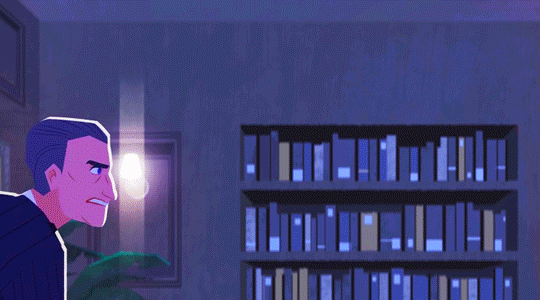
When things have seemingly been resolved, Chase and Zari are in conference with Chief who details how she deems that it was all an elaborate plan where Roundabout and Carmen were in cahoots. In what is shown to be his first moment ever displaying his new and differing opinions to Chief on the events prior, he details how, maybe, Carmen left the items here for them to discover purposefully. Chief glares at him silently, Chase displaying an awkward reluctant smile, then ignores his opinion moving on. She informs him that it is his job to interrogate Roundabout for answers on how Carmen is connected to him, disregarding his prior though they are not united until Zari receives a phone call. They are informed that Roundabout never reached the destination and has escaped.
S03E05


A Sum Up:
In conclusion, Chase has officially changed opinions on Carmen Sandiego and has fallen into the role Julia left for him when she departed from ACME. Even with the pre-existing knowledge of the hacking by Player and all other indiscretions against him perpetrated by Team Red. He has been through a journey and come out the end with a new perspective
Agent Zari has now acted as both Julia’s and now Chase’s, well ‘Chase’, when it comes to the dynamic of the pairing. In many instances when consulting Chief, Julia has been informed to essentially ‘do her job’ or is only half-listen too, in a subtle way, instead of coming up with theories that don’t necessarily correlate with the majority. This all comes ahead in S03E02 ‘The Day of the Dead Caper’, where Chief is finally blunt with Julia (see below). The same thing has now befallen Chase (see below), except with little to no lead up to instant rejection. All of Chief’s patience for differing opinions was used up, all on Julia it appears.
S03E05
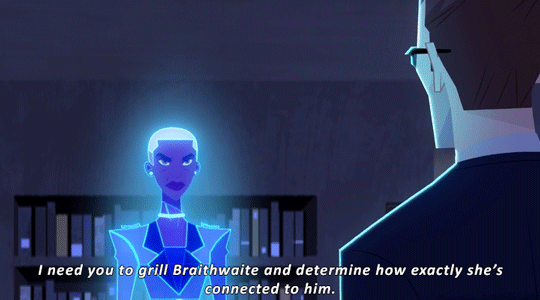
S03E02

The summation of all this produces a new defender of Carmen Sandiego; Chase Devineaux. The likely future outcome will be Chase attempting to contact, seek an audience with Carmen as Julia once attempted, and would succeeded in part from time to time. It is unlikely how well this will go considering Chase and is usually outwardly expressive with his determination to arrest her. One can only hope he is given a chance to rectify his past miscalculations and is able to further support these new set beliefs to ACME, Carmen Sandiego and himself.
One can also hope Julia returns, maybe by a proposition from Chase, who will no doubt have trouble enacting his new purpose of true justice, and seeking answers/help from Carmen Sandiego. This would also promote a chance for an adult discussion, an apology, one sorely lacking in Season 3 between them. With this new air of familiarity between their opinions on Carmen, a rare opinion it appears, a chance for a reformation of a proper team dynamic is possible.
They lacked a connection throughout season 1 and 2 which aided in their bitter union, both full-heartedly, if not realised or intentional, determined to have their opinion victorious over the other to themselves and to those around them. Chase far more openly critical and cynical, Julia keeping such comments more hidden and modest, but also far more willing to stand up for herself to and in front of Chief. (Prominent examples seen in S02E02,4 & 8, S03E02) Chase was aware of his poor behaviour but found it justified in a sense that he truly believed she was misguided, that he was correct about Carmen Sandiego, now knowing she clearly was right all along. (This does not excuse/justify his rudeness in any sense, but can explain it.)
They would be a great team, now finally on the same page but unfortunately separated. Julia has the nohow and Chase possess the drive to make it happen. They do share those traits, each more natural at one over the other. Neither are willing to give up without a fair fight, and proudly declare and justify themselves at every turn, both proud individuals. (Julia far more modest in comparison). If they worked together, who knows the possibilities, if they can change ACME’s stance on Carmen Sandiego or if they decide to abandon it altogether and aid the other fighter of VILE, Team Red. Either way, it was clear Julia could not do it all on her own and I’m sure we will see Chase realise and suffer the same fate. Hopefully reasoning that he needs help, not getting it to form anyone else, remembering Julia, seeking her out and bringing her back to ACME.
Her reason for leaving ACME was that her heart was no longer in it, her passion snubbed out. Her work now directly contradicts her beliefs which are doubted by all those around her at every turn.

A sad but visibly true thing as no one else in ACME was willing to consider her way any longer, her opinion not shared by anyone else, a very demoralising thing to go through. She was always fighting and standing up on her own.
With Chase now sharing this opinion, the burden of seeing and knowing the truth, it will be easier to stand behind with full conviction, to attempt to highlight the innocence Carmen Sandiego has hidden in plain sight, together. Only time will tell how it all plays out.
#season3spoilers#welp#thats was longer than i wanted it to be#HOPE YALL LIKED IT?#chase devineaux#julia argent#carmen sandiego#carmen sandiego netflix#if i come back and read this and find any mistakes i will murder someone#cs chase devineaux#cs julia argent#cs 2019#cs#cs chief#cs agent zari#agent zari#cs roundabout#disfordevineaux#text
344 notes
·
View notes
Text
Malcolm & Marie and the Rise of Quarantine Filmmaking in COVID
https://ift.tt/3p29Il0
At the start of the COVID-19 pandemic, a time when accomplishing even the simplest tasks had taken on the burden of the impossible, Netflix’s “secret pandemic movie,” Malcolm & Marie, became a way to process a year of stalled projects and compromised creative control. A Deadline feature retraced how Zendaya, one half of the two-hander’s cast, reached out to Euphoria creator Sam Levinson with the plea for a self-contained project when COVID delayed the HBO drama’s new season.
As Levinson rushed to write a script based loosely on his own experiences of failing to thank his wife at a movie premiere, he and Zendaya brought on Tenet star John David Washington for a movie at the complete opposite end of the spectrum from Christopher Nolan’s blockbuster; the Euphoria crew, in a COVID bubble in California, were able to keep working for a few weeks in June 2020 when so many others were laid off. What they created was a passionate, claustrophobic black-and-white relationship drama that has the rare distinction of being created during a pandemic while its story still reflects life before the virus.
On its own, Malcolm & Marie falls somewhat short of Oscar bait expectations. However, the film takes on greater nuance when considered in the context of the growing subgenre of post-lockdown movies. While this may ultimately prove to be a short-lived category of filmmaking, it already includes four incredibly varied films. Even if they all started with the same universal constraints—COVID tests and social distancing, small casts instead of big—they make for radically different statements about human connection (either during the pandemic or not), futility, about purpose.
In fact, you can plot these four movies over the axes of ignoring COVID versus acknowledging COVID in their actual plots, and closeness versus distance in the execution of said stories.
Malcolm & Marie
Ignoring the Virus and Embracing the Closeness of Quarantine
What’s immediately ironic about Malcolm & Marie is that its setting is anathema to our current situation: The eponymous couple come home from a movie premiere (remember those?), where he (Washington) is being celebrated as a rising Hollywood talent, and she (Zendaya)—an amateur actress, a recovering drug addict, definitely not a model—has been reduced merely to his loyal girlfriend. Their feature film-length fight might take place within the bounds of their spacious rented house, but every source of conflict and sticking point exists out in a non-pandemic world.
At the same time, the viewer is tangentially aware of the real-world limitations in filming this movie, i.e. the need to stay in one setting with only two players. The inability to leave that house–except for Marie’s desperate little steps of leaning out the window to smoke or of that ambiguous ending–is authentic to anyone who has been stuck in a relationship-defining fight: There are no shortcuts, no escapes; the only option is to see it through to the ugly end, only to watch the toxic cycle start all over again.
The actors’ close attention and shaping of their roles lends Malcolm and Marie’s relationship real intimacy, but it also contributes to the sheer exhaustion of watching these young lovers metaphorically eat their own tails without getting anywhere. Despite Malcolm’s appalling outbursts and Marie’s stunning monologues, nothing really changes; even his quiet “I’m sorry” at the end is a puny concession after all that emotional effort.
In fact, this ouroboros feels most like a reflection of the endlessly unfruitful fights that many a couple has experienced since lockdown began.
Locked Down
Acknowledging the Virus and Embracing the Closeness of Quarantine
By contrast, Mr. & Mrs. Smith director Doug Liman’s Locked Down casts its marquee stars (Anne Hathaway and Chiwetel Ejiofor) as ordinary people in the extraordinary circumstances of early 2020, when a pandemic that people still didn’t fully understand reshaped their home into a workspace, and work into a prison rather than an outlet. Steven Knight’s script—written in July 2020, on a dare—carries so many authentic field notes that it’s almost difficult to watch. You feel it from Zoom fatigue, with wine o’clock creeping up into the AM, to people talking over one another on video calls where they’re ostensibly checking in on each other.
Liman also employed the same amusing device used by the Parks and Recreation COVID special, in which real-life couples had to explain why their characters happened to be inhabiting the same physical space during this era of highly negotiating personal contact. In Locked Down, it’s Psych star Dulé Hill and his costar (and real-life wife) Jazmyn Simon as the sympathetic American counterparts to Linda (Hathaway) and Paxton (Ejiofor), an American and a Brit who are not holding up well enough in quarantine. (A bevy of cameos, including Mark Gatiss, Mindy Kaling, Ben Kingsley, and more also scratches that itch of wondering what celebrities’ homes might look like.)
Paxton and Linda’s marriage seems to have ended around Christmas 2019, but being stuck in their flat just as the pandemic hit—he’s a driver unable to work while she’s a CEO who has the excruciating duty of firing her “family” of coworkers over Zoom—has beaten their senses of purpose to a pulp. Paxton attempts to make up for that by making the masked grocery runs and trying to connect with his neighbors through shouted evening poetry, but he’s suffering the all-too-familiar depression of the furloughed. Linda isn’t far behind when she finally confronts the soullessness of her corporate job.
When fate delivers the incredible coincidence of Linda overseeing the load-out of a priceless diamond from Harrods—with Paxton assigned to transport the goods—the estranged couple decide to embark on a heist, because truly what else are you going to do during a pandemic? Ultimately, Locked Down does a better job with the romantic dramedy aspect than the heist, yet its use of the iconic London department store is as ambitious as Ocean’s 8 with the Metropolitan Museum of Art. Though there are more twists to the movie’s character studies than the logistics of nicking the diamond, the scenes in which Linda and Paxton stroll through the deserted Harrods food court—which arguably carries just as many culinary treasures—provide that same breathless sense of getting away with something.
Both films were made with unprecedented levels of safety and sacrifice, which regardless of the final products’ quality will always set them apart from pre-COVID entertainment as successes in filmmaking. But then there are the COVID films that have embraced social distancing, building it into a plot point or stylistic device rather than employing movie magic to obscure it.
Host
Acknowledging the Virus and Embracing Social Distancing
Interestingly, one of Levinson’s early pitches to Zendaya was a horror film, although of course they eventually pivoted to relationship drama. Fortunately, another enterprising group of creatives went the horror route, and they managed to fold in a poignant tale of female friendship over digital distances in 2020’s Host.
A British found footage successor to Paranormal Activity told entirely over Zoom, this indie tale has a shockingly reasonable premise: Five girlfriends, bored to tears during lockdown, decide to conduct a séance. (Again, what else are you going to do?) But when sarcastic Jemma (Jemma Moore) fakes a backstory about a suicidal friend and their medium Seylan (Seylan Baxter) mysteriously drops the call, the girls are on their own as a demonic force crosses over into the physical plane… and into each of their flats.
Read more
Movies
Upcoming Movies in February 2021: Streaming, VOD, and Theaters
By David Crow
Movies
Jurassic World 3 Photos Released as Production Resumes
By David Crow
In the past year, we’ve all learned that Zoom calls can be awkward, boring, and occasionally revelatory—but this is the first time they’re truly scary. Host utilizes the familiar horror tropes of darkened rooms and whispered panting at the slightest of suspicious noises, but it takes on an utterly disturbing dimension when it’s five young women, in the prime of their lives, are all trapped at home apart from one another—not even that far, as Jemma and séance enthusiast Haley (Haley Bishop) live within walking distance of each other.
In found footage fashion, there are plenty of Paranormal Activity-esque moments of people getting dragged or lifted by otherworldly forces. Kudos to director and co-writer Rob Savage for remotely directing his actors, who had to learn how to do the aforementioned practical effects inside their own homes. But where Host is scariest is when it leans into Zoom technology, from a chilling use of silly facial filters to a sequence that will make you reconsider ever making a custom video background for your future Zooms.
As the demon begins picking them off at random, with the others watching in helpless horror, Jemma’s shift from apathetic nonbeliever to selflessly trying to save Haley is incredibly moving. There’s so much history to this fractured friendship that you’ll be rooting for them to reconcile, even as you realize Host’s final trick: It’s only as long as an unpaid Zoom session.
How It Ends
Ignoring the Virus But Still Embracing Social Distancing
You could make the argument that Daryl Wein and Zoe Lister-Jones’ pre-apocalyptic comedy could be interpreted as taking place during COVID, what with its many comedy stars all acting a conspicuous six or more feet from one another. It’s just that even if that were true, it wouldn’t matter, because there are bigger fish to fry. Specifically, an asteroid en route for Earth, conveniently set to make impact at the end of Liza’s (Lister-Jones) and everyone else’s last day in sunny Los Angeles.
Trying to make it to an end-of-the-world party in LA without her car, which has been stolen, Liza and her younger self (Devs’ Cailee Spaney) wander through the aggressively bright county, populated with other people doing their best to cope. Unlike the other films on this list, How It Ends makes no effort to hide that it was shot with stringent COVID protocols enforcing social distancing: Cameos from the likes of Fred Armisen and Lamorne Morris are shot on different floors of houses while Bradley Whitford is so far removed in his scene that it’s impossible to get him and Lister-Jones in the same shot.
How It Ends is more a series of loosely-connected sketches than a super cohesive narrative, but that’s how the film manages to bring in so many talented stars as kooky strangers whom the two Lizas encounter, from Nick Kroll as the shadiest of drug dealers to Olivia Wilde as Liza’s estranged psychic friend (a scene-stealer) ,to Ayo Edibiri (another absolute delight) as a teacher who decided, hey, why not try her hand at stand-up comedy while she still can? Even with this layer of grim humor, get ready for this movie to spark unexpected pathos in these Decameron-esque encounters between strangers. By leaning into the physical distance between these characters, How It Ends shows how even when faced with the literal apocalypse, humans will still hold themselves apart from one another. While Liza makes peace with a number of key figures from her life, by the time the asteroid is creeping its way to the horizon, she is faced with her most challenging, but also most freeing, task: To accept that it’s okay to just be alone with yourself during a world-changing catastrophe.
cnx.cmd.push(function() { cnx({ playerId: "106e33c0-3911-473c-b599-b1426db57530", }).render("0270c398a82f44f49c23c16122516796"); });
The post Malcolm & Marie and the Rise of Quarantine Filmmaking in COVID appeared first on Den of Geek.
from Den of Geek https://ift.tt/3rMMkKf
0 notes
Text
stealing all of op's tags because you're right and you should say it
#they're literally best friends look at them#numbers right next to each other... no nonsense tall guy + silly smiley shorter guy... realist + idealist...#unstoppable force (jan's honesty & inability to read a room) vs immovable object (dani's positivity & inability to read a room)#in the first ep of s3 when they're talking about richmond being placed last on everyone's predictions for the season or smth:#jan spitting out statistics about relegations that no one wants to hear + dani's 'maybe they're trying to motivate us!'#the inability to read a room but on opposite ends of the spectrum is something that can be so personal via @obisamya






DANI ROJAS & JAN MAAS Ted Lasso (2020-2023)
2K notes
·
View notes